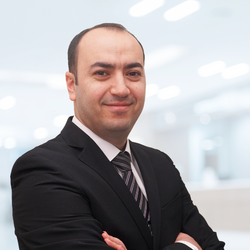Filter By
Name
Consultation Mode
Gender
Price Range






Nephrologist in Dubai, Abu Dhabi, Sharjah & Across UAE | Kidney Health Experts – ShopDoc
Find top-rated nephrologists in Dubai, Abu Dhabi, Sharjah, and throughout the UAE on ShopDoc. Nephrologists are specialized medical doctors who diagnose, treat, and manage conditions affecting the kidneys. If you're dealing with kidney problems, high blood pressure, or chronic conditions like diabetes that may impact kidney function, consulting a nephrologist is crucial to prevent complications and ensure optimal kidney health.
What Does a Nephrologist Do?
A nephrologist focuses on diseases and disorders of the kidneys and the urinary system. These specialists help manage acute and chronic kidney disease, electrolyte imbalances, high blood pressure, and complications from systemic illnesses like diabetes and autoimmune diseases. They also provide care for patients on dialysis and those undergoing kidney transplant evaluations.
Common Conditions Treated by Nephrologists
-
Chronic Kidney Disease (CKD)
-
Acute Kidney Injury (AKI)
-
Kidney stones
-
Glomerulonephritis
-
Polycystic Kidney Disease (PKD)
-
Urinary tract infections (UTIs)
-
Electrolyte and fluid imbalances
-
End-stage renal disease (ESRD)
-
Hypertension-related kidney issues
-
Kidney complications due to diabetes
Diagnostic and Treatment Services Offered
-
Comprehensive kidney function evaluation
-
24-hour urine analysis and blood tests
-
Renal ultrasound and imaging support
-
Hypertension and electrolyte management
-
Dialysis planning and monitoring (hemodialysis, peritoneal dialysis)
-
Pre- and post-kidney transplant care
-
Nutritional and lifestyle counselling for kidney health
Why Choose ShopDoc for Nephrology Care?
-
Access to certified and highly experienced nephrologists across the UAE
-
Personalized treatment plans with a holistic approach to kidney care
-
Integrated care for diabetic and hypertensive kidney disease
-
Advanced diagnostics and dialysis center partnerships
-
Online and in-clinic appointments available in Dubai, Abu Dhabi, Sharjah, Ajman, and beyond
-
Multilingual support for diverse communities
When to See a Nephrologist?
You should consult a nephrologist if you experience symptoms such as:
-
Swelling in the legs, ankles, or around the eyes
-
Foamy or bloody urine
-
Fatigue, weakness, or difficulty concentrating
-
Persistent high blood pressure
-
Frequent urination, especially at night
-
Unexplained changes in urine color or volume
-
Kidney-related complications from diabetes or hypertension
Early detection and regular monitoring can help slow down kidney disease progression and prevent serious outcomes.
Frequently Asked Questions (FAQ)
Can kidney disease be cured?
While chronic kidney disease cannot usually be cured, early diagnosis and treatment can slow its progression and manage symptoms effectively.
What are the warning signs of kidney failure?
Signs include reduced urine output, swelling, shortness of breath, confusion, and fatigue. In severe cases, hospitalization or dialysis may be required.
Is dialysis always needed for kidney disease?
Not always. Dialysis is typically required in end-stage kidney disease. Many patients can manage their condition for years without dialysis through medication, diet, and regular check-ups.
Can a nephrologist help with high blood pressure?
Yes. Nephrologists are experts in managing secondary hypertension caused by or impacting the kidneys.
What tests are commonly ordered by nephrologists?
Tests may include blood urea nitrogen (BUN), serum creatinine, estimated glomerular filtration rate (eGFR), urinalysis, imaging tests, and kidney biopsies if necessary.
Who is a neurologist?
A nephrologist is a medical professional who focuses on identifying and treating disorders that impact kidney function. In addition to working frequently with other specialists in dialysis and transplant cases, they are essential in the management of kidney failure, electrolyte imbalances, and hypertension.
Conditions Treated by Nephrologists
Electrolyte imbalances polycystic kidney disease glomerulonephritis, a chronic kidney disease Kidney stones and hypertension-related kidney problems are all treated by nephrologists. Additionally, they oversee dialysis care and evaluate patients in preparation for possible kidney transplants.
When to Visit a Nephrologist
A kidney problem may be indicated if symptoms like fatigue, swelling, elevated blood pressure, or changes in urination occur. For preventative care, people with diabetes, high blood pressure, or a family history of kidney disease should think about seeing a nephrologist.
FAQ
What does a neurologist treat?
Among other kidney-related problems, nephrologists treat electrolyte imbalances, hypertension, and kidney diseases.
When should I see a nephrologist?
It is recommended that you see a nephrologist if you have elevated blood pressure, swelling, or changes in your urine.
Can nephrologists treat kidney stones?
Indeed, kidney stones are diagnosed, treated, and kept from recurring.
What is dialysis, and is it done by nephrologists?
Dialysis is a kidney failure treatment that involves blood filtration by machines under the supervision of nephrologists. .
ShopDoc India
All rights reserved by ShopDoc FZ LLC,
In5 Tech, Dubai Internet City


